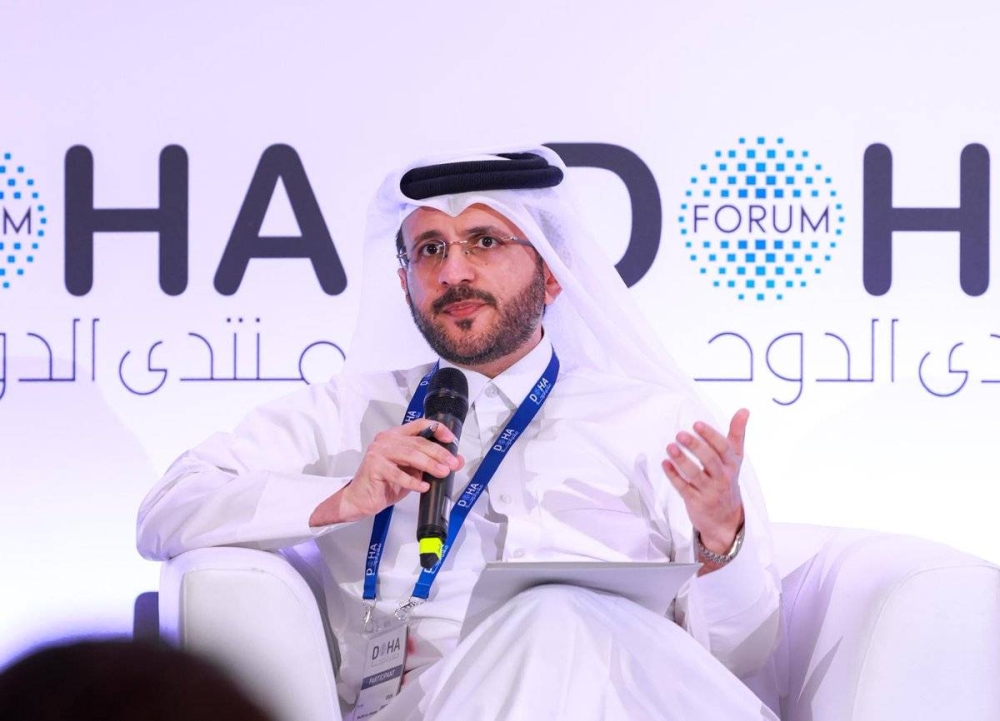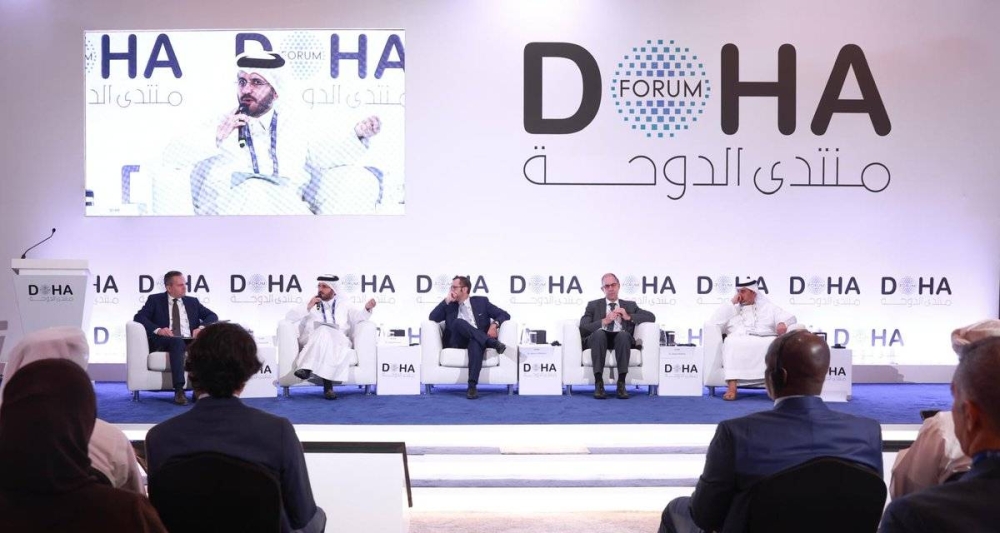Advisor to the Prime Minister and Official Spokesperson for the Ministry of Foreign Affairs Dr. Majed bin Mohammed Al Ansari stressed that the State of Qatar is proud of the effective political roles it undertakes at the regional and international levels, indicating that this is due to its political will through which it seeks to achieve the best for the region and the world.
In a discussion session titled 'Transformative Diplomatic Strategies for Contemporary Geopolitical Challenges' held as part of the activities of the first day of the Doha Forum 2024, Al Ansari said that the State of Qatar has confirmed its ability to assume the tasks of mediation in settling disputes and resolving conflicts and has developed its tools to work with the international community to achieve this. It has gone beyond the level of countries and dealt with non-governmental organizations and parties in this framework in order to achieve sustainable peace in many regions of the world.
During the session addressed by Deputy Secretary General of the Konrad-Adenauer Stiftung (KAS) Dr. Gerhard Wahlers, Vice President of the Italian Institute for International Political Studies (ISPI) Antonio Villafranca, and Director General of the Dubai Center for Public Policy Research Mohammed Baharoon, and moderated by Head of the Middle East and North Africa Department at the KAS Dr. Thomas Falk, he added that there are many countries whose internal domestic policies prevent them from working outside their borders as a mediating state in resolving conflicts, unlike the State of Qatar, which makes great efforts to settle disputes between disputing parties, considering this a matter rooted in its culture.
He explained that the word "mediation" is mentioned in the Constitution of the State of Qatar as a tool for its foreign policy, and it has always played important roles in this field and in various contexts, such as mediation in Darfur, Yemen, Afghanistan, Iran and other countries, noting that Qatar does this without having an interest in the conflict, or the conflict having any impact on it.
The Advisor to the Prime Minister and Official Spokesperson for the Ministry of Foreign Affairs said the State of Qatar undertakes the role of mediation and conflict resolution with the aim of contributing and cooperating with the international community to enhance security and stability at the global level. Qatar operates in a neutral and tactical manner within this framework, so that it only represents the interests of the two conflicting parties in the negotiation process, in addition to focusing on the geopolitical aspect that enables it to work flexibly and effectively.
He continued by saying that the State of Qatar maintains its positions and expresses them very clearly before the international community, such as; Qatar's support for the Palestinian brothers in obtaining their rights represented in establishing an independent Palestinian state according to the two-state solution. On the other hand, it expresses its readiness to sit at the negotiating table with the Israeli side to reach a solution. He added that Qatar maintains its relations and ties with various parties, whether they are countries or organizations, in the peace negotiations.
During the session, Al Ansari pointed out that the most important feature of Qatari mediation lies in its ability to use many tools to achieve mediation, such as economic tools that target development, infrastructure and reconstruction after conflicts, political tools through engaging in communication with all parties in a comprehensive manner, providing aid and support, and sustainability that is concerned with continuing work to ensure achieving sustainable peace.
Advisor to the Prime Minister and Official Spokesperson for the Ministry of Foreign Affairs Dr. Majed bin Mohammed Al Ansari stated that today's world is no longer limited to local conflicts, but rather conflicts whose repercussions affect the entire world. He indicated that what is taking place in the Red Sea region or in Syria affects the Gulf region, while what is happening in the Palestinian territories is reflected in American universities, a matter which confirms the need for traditional diplomacy to develop to become more flexible taking into account modern technology and the importance of its role in reaching innovative solutions.
In the past, the geopolitical scene was clearer, particularly with the existence of a world bipolar system that divides countries into East and West during this period. Today, the multiplicity of poles confirms that everyone has no choice but for countries to cooperate with each other, small and medium-sized countries in particular, to work towards providing peace and stability for future generations, he said.
Al Ansari explained that the concept of sovereignty is different today than it was decades ago, and it now requires taking regional interests into account in decision-making alongside national interests.
The participants in the discussion session stressed that the geopolitical challenges facing the world today require new thinking and a different diplomatic approach, such as flexible and comprehensive strategies, taking advantage of advanced technologies, and applying creative solutions, unlike traditional diplomacy that often relies on formal protocols, bilateral negotiations, and promoting specific ideologies.
They pointed out that the innovative approach to diplomacy goes beyond divisions and conflicts and focuses on adopting diverse ideas, digital platforms, and cooperative initiatives aimed at enhancing dialogue and exchange of views to achieve the common goals and interests of countries, in a way that enhances transparency, integrity, and participatory governance. They called for empowering non-state actors, facilitating rapid communication and information exchange, and enabling a more flexible response to crises, including humanitarian emergencies, peacebuilding efforts, climate change, global health threats, economic development, and others.
They called for reforming many international and UN institutions such as redistributing votes fairly in the International Monetary Fund, the United Nations, and other institutions, in a way that serves the interests of all, with a focus on increasing work and coordination to achieve everything that would provide the best for the peoples of the world.
They stressed the importance of small and medium-sized countries in the world today, especially since solutions often come from these countries, which calls for not prioritizing competition among them, but rather strengthening partnerships and cooperation to achieve the desired goals.
Qatar
Advisor to Prime Minister: Qatar Proud of effective political roles it plays regionally and internationally


